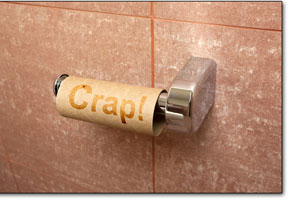
Abusing the facilities
We’d already checked two adjacent campgrounds as we left Moab along Highway 128, a magnificent corridor lined with towering rock walls that the Colorado River carved out back in its pre-history, pre-tourist days. Along this riverway the BLM provides 127 sites on a first-come, first-served basis. Thirty-five sites were occupied, only 92 left to check.
 The signs declaring “Campground Full” weren’t posted as we pulled up to the Drinks Canyon Camping Area. We had to drive in and see for ourselves. No ticket clipped to the post meant it had officially been vacated.
The signs declaring “Campground Full” weren’t posted as we pulled up to the Drinks Canyon Camping Area. We had to drive in and see for ourselves. No ticket clipped to the post meant it had officially been vacated.
“There” she declared, and jumped out of the truck before I could completely stop. I watched a passenger emerge from a car following me, sprinting, but Pam ran faster, and she knew enough to stand beside the post, arms crossed. The other woman understood body language, cursed her own luck, then returned to her car, which kicked up a cloud of dust while backing up and speeding off, presumably to be the first scavenger to find the carcass of an unoccupied site at the next upriver campground.
How strange to find so many campers settled in at 11:30 on a Tuesday morning. It felt like we’d won the public lands Powerball hosted by the BLM, a game that requires positioning and strategy if you’re smart, but also one that occasional campers stumble into by stupid luck. The jackpot, in case anyone is wondering, amounts to a grimy little camping spot on the sand, beside the Colorado, which still extracts a fee of $15 per night, even if you win. If I describe the condition of the latrine, well, it might be better to turn away from that subject and face the river. Let me just say it was running full, and muddy brown.
All afternoon, hungry drivers circled like buzzards, pulling in to determine availability, then rushing back out. By sunset the three campsites adjacent to ours were still without occupants. In addition to tickets, the tenants had positioned unfolded camp chairs like stick figures around the spot where a tent might eventually be pitched, a practice which declared they did not trust the ticket system. We fell asleep wondering if the Lower Drinks might be haunted by river ghosts.
By morning, seven cars and four motorcycles had managed to cram themselves in beside us within a space designed for three campsites. And they didn’t arrive quietly in the middle of the night. Now they were slumbering, multiple feet sticking out open car windows, sleeping bags unrolled like caterpillars waiting to transform into some kind of canyon country butterflies.
We left them in a state of chrysalis and headed out to explore one of the primitive trails we’d always been curious about. Our mountain bikes were in the truck, but we’d have to cover a few miles of four-wheel-drive rock ledges and sandy washes before arriving at the spot where we hoped to ride.
A half hour out, crawling along a singletrack, we both noticed a cloud of dust gathering in the distance. Dust devil? Too large. Construction equipment? Good guess. The BLM might be scraping together another campground.
To our surprise, as we climbed a ridge, we saw below us an open field packed with side-by-sides – you know, those elaborately engineered, high-octane-powered golf-cart-looking-things – many with engines idling, all of them crowded together in the wide-open backcountry. At least 50 machines, I swear (and I counted), with more approaching from various directions.
But to my even greater astonishment, the reason for their gathering came into focus: a single BLM toilet located at the center of their circle, and a radius of at least 30 people standing in an orderly line, waiting for a crack at the facility. Nature (human, that is) at its very best. The toilet paper must have been wiped out in the first 20 minutes.
On the trip back to our campsite, we talked about whether the canyon country around Moab really had room for two more people. Though we’d already paid for another night, we decided to pack up in the morning and head home.
We slept deeply in the fresh river air, the natural sound machine of the flowing water seeping into our dreams until headlights and engine noise infiltrated our little pocket of bliss. It was nearly midnight, again, and by morning an additional car had managed to squeeze itself into the space between a rock and a hard place.
High noon is officially checkout time, but we were ready to leave by 8 a.m. As I shut my tailgate, a driver pulled off the pavement and crept up to my bumper. He gave me a quizzical look. I smiled, gave him a thumbs-up to his unspoken question, and he backed up, leaving just enough space for me to pull past him.
The buzzards must never sleep.
– David Feela
In this week's issue...
- December 18, 2025
- Let it snow
Although ski areas across the West have taken a hit, there’s still hope
- December 18, 2025
- Look, but don't take
Lessons in pottery theft – and remorse – from SW Colorado
- December 11, 2025
- Big plans
Whole Foods, 270 apartments could be coming to Durango Mall parcel
